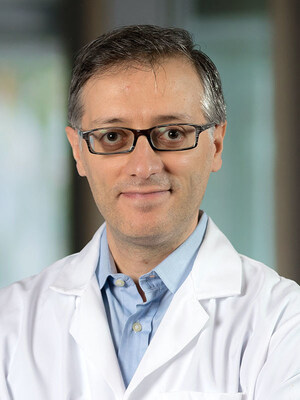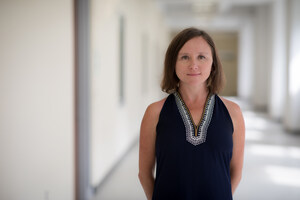BRONX, N.Y., Feb. 24, 2014 /PRNewswire-USNewswire/ -- One in every six people in the U.S. is Hispanic/Latino and as a group they live longer than non-Hispanic whites (81.4 years vs. 78.8 years). Yet, despite their strong representation and relative longevity, little is understood about this group's health conditions and behaviors.
The Hispanic Community Health Study/Study of Latinos (HCHS/SOL), the landmark research study of Hispanic/Latino health funded by the National Institutes of Health (NIH), has released initial findings that show significant variations in disease prevalence and health behaviors among groups with different backgrounds.
Initial Findings
The findings reported by the National Heart, Lung, and Blood Institute (NHLBI), part of the NIH, are the result of the national study that began in 2008. The data is based on interviews conducted with 16,415 study participants at one of four U.S. field centers ─ located in the Bronx, San Diego, Chicago and Miami.
Variation by Background
"While many trends are consistent across all four field sites, there are clear differences between participants in each city – and more importantly, between each Hispanic group," said Robert Kaplan, Ph.D., professor of epidemiology & population health and principal investigator for HCHS/SOL at Albert Einstein College of Medicine of Yeshiva University, which established and operates the Bronx field center.
Among the highlights in The Hispanic Community Health Study/Study of Latinos (HCHS/SOL) Data Book: A Report to the Communities:
- The percentage of people who report having asthma ranged from 7.4 (Mexican) to 35.8 (Puerto Rican)
- The percentage of individuals who had pre-diabetes ranged from 32.1 (Dominican) to 37.7 (Mexican)
- The percent of people eating 5 or more fruits/vegetables a day ranged from 19.2 (Puerto Rican) to 55.0 (Cuban)
- Average minutes of daily recreational activity ranged from 17.7 (Cuban) to 28.3 (Puerto Rican)
"Teasing out these variations can help clinicians, public health advocates and members of the community focus their energies in the right places," explained Dr. Kaplan, who also holds the Dorothy and William Manealoff Foundation and Molly Rosen Chair in Social Medicine at Einstein. "Ultimately, we hope to uncover the key factors that can lead to improved health for all Hispanics."
The study investigators and NIH are partnering with the National Alliance for Hispanic Health and other national and local organizations to increase the reach of the study. Today, the Alliance released a booklet showing the data reported by all four field centers. The 40-page bilingual report, titled About Our Health: Results from the Hispanic Community Health Study/Study of Latinos (SOL), will be available online.
About HCHS/SOL
HCHS/SOL is a multi-center epidemiologic study in Hispanic/Latino populations to determine the role of acculturation in the prevalence and development of disease and to identify risk factors playing a protective or harmful role. The study is sponsored by the NHLBI and six other institutes, centers and offices of the NIH.
For the first phase of HCHS/SOL, study participants underwent an extensive clinical evaluation to identify the incidence of diseases and risk factors, as well as other important characteristics such as lifestyle and health insurance status. While cardiovascular and lung health were key components of the evaluation, HCHS/SOL also performed a dental exam, hearing tests, and a glucose tolerance test. Most of the information presented in the NHLBI data book was collected through interviews. Analysis of clinical measurements performed during the baseline examination is underway.
Since the original exams between 2008 and 2011, study participants have been contacted annually to explore the relationship between their baseline health profiles and changes in health.
Einstein's research was supported by a contract from the NHLBI (N01HC65235).
About Albert Einstein College of Medicine
Albert Einstein College of Medicine of Yeshiva University is one of the nation's premier centers for research, medical education and clinical investigation. During the 2013-2014 academic year, Einstein is home to 734 M.D. students, 236 Ph.D. students, 106 students in the combined M.D./Ph.D. program, and 353 postdoctoral research fellows. The College of Medicine has more than 2,000 full-time faculty members located on the main campus and at its clinical affiliates. In 2013, Einstein received more than $155 million in awards from the NIH. This includes the funding of major research centers at Einstein in diabetes, cancer and liver disease. Other areas where the College of Medicine is concentrating its efforts include developmental brain research, neuroscience, cardiac disease, and initiatives to reduce and eliminate ethnic and racial health disparities. Its partnership with Montefiore Medical Center, the University Hospital and academic medical center for Einstein, advances clinical and translational research to accelerate the pace at which new discoveries become the treatments and therapies that benefit patients. Through its extensive affiliation network involving Montefiore, Jacobi Medical Center –Einstein's founding hospital, and five other hospital systems in the Bronx, Manhattan, Long Island and Brooklyn, Einstein runs one of the largest residency and fellowship training programs in the medical and dental professions in the United States. For more information, please visit www.einstein.yu.edu, read our blog, follow us on Twitter, like us on Facebook, and view us on YouTube.
Photo: http://photos.prnewswire.com/prnh/20120531/DC16559LOGO
SOURCE Albert Einstein College of Medicine
WANT YOUR COMPANY'S NEWS FEATURED ON PRNEWSWIRE.COM?
Newsrooms &
Influencers
Digital Media
Outlets
Journalists
Opted In






Share this article